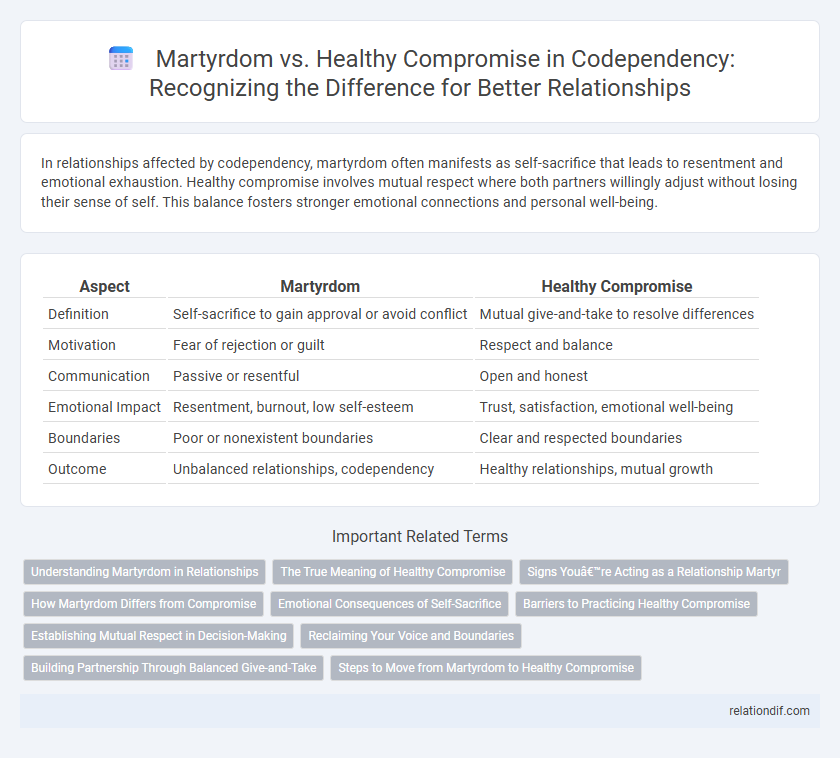In relationships affected by codependency, martyrdom often manifests as self-sacrifice that leads to resentment and emotional exhaustion. Healthy compromise involves mutual respect where both partners willingly adjust without losing their sense of self. This balance fosters stronger emotional connections and personal well-being.
Table of Comparison
| Aspect | Martyrdom | Healthy Compromise |
|---|---|---|
| Definition | Self-sacrifice to gain approval or avoid conflict | Mutual give-and-take to resolve differences |
| Motivation | Fear of rejection or guilt | Respect and balance |
| Communication | Passive or resentful | Open and honest |
| Emotional Impact | Resentment, burnout, low self-esteem | Trust, satisfaction, emotional well-being |
| Boundaries | Poor or nonexistent boundaries | Clear and respected boundaries |
| Outcome | Unbalanced relationships, codependency | Healthy relationships, mutual growth |
Understanding Martyrdom in Relationships
Understanding martyrdom in relationships involves recognizing patterns where one partner sacrifices their needs excessively to gain approval or avoid conflict, often leading to resentment and imbalance. Unlike healthy compromise, which promotes mutual respect and equitable give-and-take, martyrdom typically stems from fear of abandonment or low self-worth, undermining genuine connection. Identifying these behaviors enables individuals to establish boundaries and foster healthier, more balanced partnerships.
The True Meaning of Healthy Compromise
The true meaning of healthy compromise in the context of codependency involves mutual respect and balanced give-and-take without sacrificing personal boundaries or self-worth. Unlike martyrdom, where one party consistently puts others' needs above their own to the point of self-neglect, healthy compromise fosters open communication and emotional reciprocity. This approach promotes sustainable relationships by ensuring both individuals feel valued and their needs are adequately met.
Signs You’re Acting as a Relationship Martyr
Signs you're acting as a relationship martyr include consistently sacrificing your own needs to please others, feeling unappreciated despite your efforts, and harboring resentment that builds up over time. You often tolerate unhealthy behaviors or imbalances while suppressing your true feelings to maintain peace, leading to emotional exhaustion. Recognizing these patterns helps shift toward healthy compromise by setting boundaries and fostering mutual respect in relationships.
How Martyrdom Differs from Compromise
Martyrdom involves sacrificing personal needs to an extreme extent, often leading to resentment and emotional exhaustion, whereas healthy compromise balances individual needs with mutual respect and clear boundaries. In codependency, martyrdom manifests as an unhealthy pattern of self-sacrifice that prioritizes others at the expense of one's well-being, while compromise fosters equitable relationships and emotional reciprocity. Recognizing the distinction between these two approaches helps individuals avoid enabling dysfunctional dynamics and promotes healthier interdependence.
Emotional Consequences of Self-Sacrifice
Self-sacrifice in codependency often leads to unresolved resentment, emotional exhaustion, and diminished self-worth, contrasting sharply with the balanced give-and-take seen in healthy compromise. Martyrdom involves neglecting personal needs, fostering feelings of being undervalued and emotionally drained. Healthy compromise promotes mutual respect and emotional well-being by honoring individual boundaries and shared responsibilities.
Barriers to Practicing Healthy Compromise
Barriers to practicing healthy compromise in codependency often include fear of rejection, a deeply ingrained need for approval, and difficulty setting personal boundaries. Individuals with a martyrdom mindset may sacrifice their own needs excessively, leading to resentment and imbalance in relationships. Overcoming these barriers requires developing self-awareness, assertiveness skills, and recognizing the value of mutual respect in interactions.
Establishing Mutual Respect in Decision-Making
Establishing mutual respect in decision-making requires recognizing boundaries and valuing each person's needs equally, contrasting with codependent martyrdom where one sacrifices excessively for approval. Healthy compromise involves open communication and shared responsibility, fostering balanced relationships rather than unilateral self-sacrifice. This approach promotes emotional autonomy and sustained well-being, essential for overcoming codependent dynamics.
Reclaiming Your Voice and Boundaries
Reclaiming your voice starts with recognizing the difference between martyrdom and healthy compromise, where martyrdom involves sacrificing your needs to please others, often leading to resentment and burnout. Establishing clear boundaries empowers you to assert your needs respectfully while maintaining relationships without losing yourself. Prioritizing self-respect over people-pleasing fosters genuine connections and emotional balance essential for overcoming codependency.
Building Partnership Through Balanced Give-and-Take
Martyrdom in codependency often involves one partner sacrificing their needs excessively to maintain the relationship, leading to resentment and imbalance. Healthy compromise requires both partners actively communicating and negotiating to meet mutual needs without self-neglect. Building partnership through balanced give-and-take fosters respect, emotional support, and sustainable connection.
Steps to Move from Martyrdom to Healthy Compromise
Identify personal boundaries to prevent self-sacrifice and recognize when needs are being neglected in martyrdom. Practice assertive communication, expressing feelings and desires clearly while respecting others' perspectives to foster mutual respect. Develop emotional awareness through mindfulness and self-reflection to balance giving and receiving, promoting healthy compromise in relationships.
Martyrdom vs Healthy compromise Infographic

 relationdif.com
relationdif.com